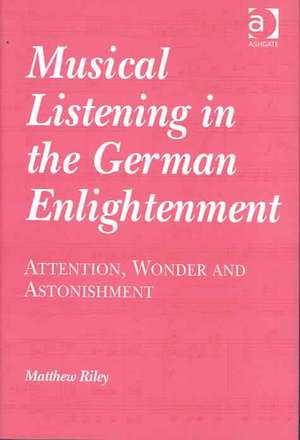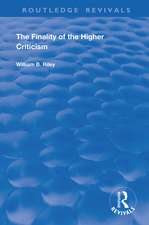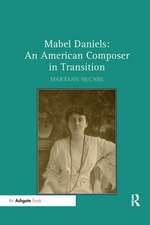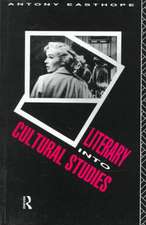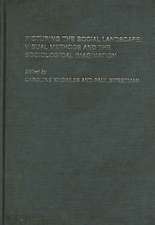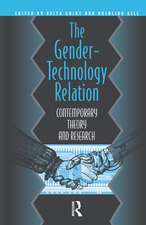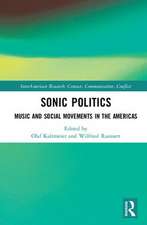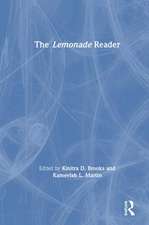Musical Listening in the German Enlightenment: Attention, Wonder and Astonishment
Autor Matthew Rileyen Limba Engleză Hardback – 22 oct 2004
| Toate formatele și edițiile | Preț | Express |
|---|---|---|
| Paperback (1) | 489.26 lei 6-8 săpt. | |
| Taylor & Francis – 11 noi 2016 | 489.26 lei 6-8 săpt. | |
| Hardback (1) | 1002.95 lei 6-8 săpt. | |
| Taylor & Francis – 22 oct 2004 | 1002.95 lei 6-8 săpt. |
Preț: 1002.95 lei
Preț vechi: 1223.11 lei
-18% Nou
Puncte Express: 1504
Preț estimativ în valută:
191.94€ • 199.65$ • 158.46£
191.94€ • 199.65$ • 158.46£
Carte tipărită la comandă
Livrare economică 14-28 aprilie
Preluare comenzi: 021 569.72.76
Specificații
ISBN-13: 9780754632672
ISBN-10: 0754632679
Pagini: 200
Dimensiuni: 156 x 234 x 13 mm
Greutate: 0.53 kg
Ediția:1
Editura: Taylor & Francis
Colecția Routledge
Locul publicării:Oxford, United Kingdom
ISBN-10: 0754632679
Pagini: 200
Dimensiuni: 156 x 234 x 13 mm
Greutate: 0.53 kg
Ediția:1
Editura: Taylor & Francis
Colecția Routledge
Locul publicării:Oxford, United Kingdom
Cuprins
Contents: Introduction; Attentive Listening: The problem of attention; The theory and significance of attention: Descartes to Meier; Pleasure, emotion and the 'flow' experience; Adaptation of mimesis; Adaptation of rhetoric; Wonder and astonishment. Interlude: Rousseau's Transports of Attention: Simultaneous and successive unities; Applications. Sulzer and the Aesthetic Force of Music: Civilizing the savage; The aesthetic force of music. Forkel on Expert and Amateur Listening Practices: Kenner and Liebhaber: two modes of hearing; Musical decline and Forkel's remedy; Concert programming: pleasure, amusement and instrumental music; A metaphysical history of musical hearing; A new approach to attention. Elements of a Rhetoric of Attention: Arousing the attention: the rules of periodicity; Sustaining the attention: a musical dispositio; Forkel on music-rhetorical figures; The rhetoric in practice: Georg Benda and C.P.E. Bach. Bibliography; Index.
Recenzii
'Matthew Riley's book is a major contribution which offers new insights into this hitherto poorly understood period in the history of listening, and provides the tools for further investigation into musical composition, performance and reception... This is an impressive study... Riley is erudite and enlightening and his close readings offer much to the expert reader, but the book as a whole is accessible to the non-expert. Kenner and Liebhaber alike are served well, making this an essential book for anyone interested in 18th-century music aesthetics.' Early Music '... an impressive contribution to the history of music theory and psychology...' Current Musicology 'All scholars interested in the growth of the social and cultural prestige of music in Germany and, further, in expanding their horizons beyond longstanding truisms about Romantic musical thought, will find Michael Riley's clear, well-written, thoughtful, and concise book enriching... a model of clarity and thoroughness...' German Studies Review '... a detailed examination of philosophical and aesthetic theories espoused by Enlightenment thinkers. As such it compliments other scholarly research dealing with eighteenth-century aesthetics... Overall his book is well-researched, finely argued, and clearly written. It will provide readers with much insight into eighteenth-century views on listening and attention and supplement emerging studies on audience behavior.' Music Research Forum ’Matthew Riley has added considerably to our understanding of eighteenth-century musical thought. His effort to shed light on the importance of Aufmerksamkeit in the writings of Forkel and Sulzer is well-researched and carefully crafted.’ Ad Parnassum
Descriere
The silent attentiveness expected of concert audiences is one of the most distinctive characteristics of modern Western musical culture. This is the first book properly to examine the concept of attention in the history of musical thought and its foundations in the writings of German musical commentators of the late eighteenth century. Matthew Riley examines the significant writers on the topic (Descartes, Leibniz, Wolff, Baumgarten, Rousseau, Meier, Sulzer and Forkel) and provides analytical case studies to illustrate how these perceived modes of attention shaped interpretations of music of the period.
